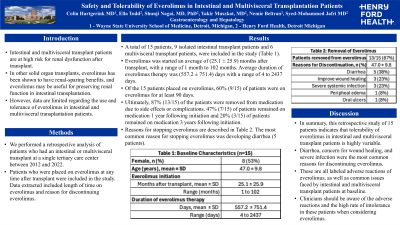Monday Poster Session
Category: Small Intestine
P3185 - Safety and Tolerability of Everolimus in Intestinal and Multivisceral Transplantation Patients
Monday, October 28, 2024
10:30 AM - 4:00 PM ET
Location: Exhibit Hall E

Has Audio

Colin Hartgerink, BS
Wayne State University School of Medicine
Detroit, MI
Presenting Author(s)
Colin Hartgerink, BS1, Ella Todd, 2, Shunji Nagai, MD, PhD3, Yakir Muszkat, MD3, Nemie Beltran, RN2, Syed-Mohammed Jafri, MD2
1Wayne State University School of Medicine, Detroit, MI; 2Henry Ford Health, Detroit, MI; 3Henry Ford Hospital, Detroit, MI
Introduction: Intestinal and multivisceral transplant patients are at high risk for renal dysfunction after transplant. In other solid organ transplants, everolimus has been shown to have renal-sparing benefits, and everolimus may be useful for preserving renal function in intestinal transplantation. However, data are limited regarding the use and tolerance of everolimus in intestinal and multivisceral transplantation patients.
Methods: We performed a retrospective analysis of patients who had an intestinal or multivisceral transplant at a single tertiary care center between 2012 and 2022. Patients who were placed on everolimus at any time after transplant were included in the study. Data extracted included length of time on everolimus and reason for discontinuing everolimus.
Results: A total of 15 patients, 9 isolated intestinal transplant patients and 6 multivisceral transplant patients, were included in the study. The mean age at time of transplant was (47.0 ± 9.8) years and 53% (8/15) patients were female. Everolimus was started an average of (25.1 ± 25.9) months after transplant, with a range of 1 month to 102 months. Average duration of everolimus therapy was (557.2 ± 751.4) days with a range of 4 to 2437 days. Of the 15 patients placed on everolimus, 60% (9/15) of patients were on everolimus for at least 90 days. Ultimately, 87% (13/15) of the patients were removed from medication due to side effects or complications. 47% (7/15) of patients remained on medication 1 year following initiation and 20% (3/15) of patients remained on medication 3 years following initiation. The most common reason for stopping everolimus was developing diarrhea (5 patients). The other reasons for discontinuing everolimus were to improve wound healing in the setting of surgery (3 patients), severe systemic infection (3 patients), peripheral edema (1 patient), and oral ulcers (1 patient). No patients died while being treated with everolimus.
Discussion: In summary, this retrospective study of 15 patients indicates that tolerability of everolimus in intestinal and multivisceral transplant patients is highly variable. Diarrhea, concern for wound healing, and severe infection were the most common reasons for discontinuing everolimus. These are all labeled adverse reactions of everolimus, as well as common issues faced by intestinal and multivisceral transplant patients at baseline. Clinicians should be aware of the adverse reactions and the high rate of intolerance in these patients when considering everolimus.
Disclosures:
Colin Hartgerink, BS1, Ella Todd, 2, Shunji Nagai, MD, PhD3, Yakir Muszkat, MD3, Nemie Beltran, RN2, Syed-Mohammed Jafri, MD2. P3185 - Safety and Tolerability of Everolimus in Intestinal and Multivisceral Transplantation Patients, ACG 2024 Annual Scientific Meeting Abstracts. Philadelphia, PA: American College of Gastroenterology.
1Wayne State University School of Medicine, Detroit, MI; 2Henry Ford Health, Detroit, MI; 3Henry Ford Hospital, Detroit, MI
Introduction: Intestinal and multivisceral transplant patients are at high risk for renal dysfunction after transplant. In other solid organ transplants, everolimus has been shown to have renal-sparing benefits, and everolimus may be useful for preserving renal function in intestinal transplantation. However, data are limited regarding the use and tolerance of everolimus in intestinal and multivisceral transplantation patients.
Methods: We performed a retrospective analysis of patients who had an intestinal or multivisceral transplant at a single tertiary care center between 2012 and 2022. Patients who were placed on everolimus at any time after transplant were included in the study. Data extracted included length of time on everolimus and reason for discontinuing everolimus.
Results: A total of 15 patients, 9 isolated intestinal transplant patients and 6 multivisceral transplant patients, were included in the study. The mean age at time of transplant was (47.0 ± 9.8) years and 53% (8/15) patients were female. Everolimus was started an average of (25.1 ± 25.9) months after transplant, with a range of 1 month to 102 months. Average duration of everolimus therapy was (557.2 ± 751.4) days with a range of 4 to 2437 days. Of the 15 patients placed on everolimus, 60% (9/15) of patients were on everolimus for at least 90 days. Ultimately, 87% (13/15) of the patients were removed from medication due to side effects or complications. 47% (7/15) of patients remained on medication 1 year following initiation and 20% (3/15) of patients remained on medication 3 years following initiation. The most common reason for stopping everolimus was developing diarrhea (5 patients). The other reasons for discontinuing everolimus were to improve wound healing in the setting of surgery (3 patients), severe systemic infection (3 patients), peripheral edema (1 patient), and oral ulcers (1 patient). No patients died while being treated with everolimus.
Discussion: In summary, this retrospective study of 15 patients indicates that tolerability of everolimus in intestinal and multivisceral transplant patients is highly variable. Diarrhea, concern for wound healing, and severe infection were the most common reasons for discontinuing everolimus. These are all labeled adverse reactions of everolimus, as well as common issues faced by intestinal and multivisceral transplant patients at baseline. Clinicians should be aware of the adverse reactions and the high rate of intolerance in these patients when considering everolimus.
Disclosures:
Colin Hartgerink indicated no relevant financial relationships.
Ella Todd indicated no relevant financial relationships.
Shunji Nagai indicated no relevant financial relationships.
Yakir Muszkat indicated no relevant financial relationships.
Nemie Beltran indicated no relevant financial relationships.
Syed-Mohammed Jafri: Gilead, Takeda, Abbvie, Intercept, VectivBio – Advisor or Review Panel Member, Speakers Bureau.
Colin Hartgerink, BS1, Ella Todd, 2, Shunji Nagai, MD, PhD3, Yakir Muszkat, MD3, Nemie Beltran, RN2, Syed-Mohammed Jafri, MD2. P3185 - Safety and Tolerability of Everolimus in Intestinal and Multivisceral Transplantation Patients, ACG 2024 Annual Scientific Meeting Abstracts. Philadelphia, PA: American College of Gastroenterology.
